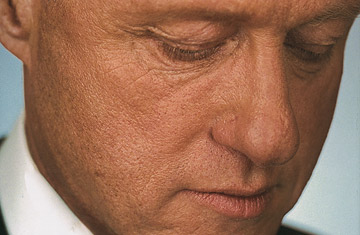
John D. Gartner's In Search of Bill Clinton: A Psychological Biography.
John D. Gartner chose wisely. It's hard to think of someone whose life has provided more fodder for a psychological biography than former President Bill Clinton. Gartner, a psychologist at Johns Hopkins University, and author of In Search of Bill Clinton talks to TIME about Clinton's manic tendencies, his power over crowds, and why the Monica affair was a true love story.
You say you practice "psycho journalism" with this book. What's the difference between that and just a plain old biography?
Psychologists have never done investigative journalism when they've written these biographies. Their books are always based on records or things they could research in a library. I actually went to Arkansas and Ireland and Africa and really chased down the story of who this guy is by interviewing lots of people—4,000 pages of interviews. I really wanted to take my skills as a psychologist but go out and actually get original material.
Your whole book is based on this psychological evaluation of Clinton as "hypomanic." What does that mean?
It's important to start out with the idea that it's a temperament. It's inborn, it's genetic, it's not an illness. Hypomanic people have tremendous energy. Clinton hardly sleeps. He can campaign for three or four days straight without a break. With this syndrome, you also have immense confidence, and it makes you someone who is very ambitious, hard-working, and creative. There are a lot of positives. At the same time, there are those vulnerabilities. Impulsiveness—not just in the area of sex, but also in eating, and in terms of his temper.
Who else would you characterize as being hypomanic?
Theodore Roosevelt is a wonderful example. I compare Clinton to Roosevelt a lot in that they are so much alike in terms of being these gifted, hypomanic, genius presidents. Recently, Newt Gingrich was our last great hypomanic figure. He was very grandiose, a man leading a revolution.
You write that Clinton, "simply has more God-given talent than any politician we've ever seen." You're not the first to note something like that, but you do offer some psychological reasons why.
Think about the possibility of being both the smartest and the most empathic person in the room. These are traits that are completely independent of each other. That's like being both the smartest person in a room as well as the tallest. What are the odds of that? With Clinton, you have someone who is bright, energetic, empathic, extroverted, and curious. It's like a quintuple threat.
How is it, as you claim in your book, that much of the conventional wisdom regarding Bill Clinton and sex is deeply flawed?
What people don't realize, because they've heard all the jokes, you know, cigars and stuff, is that this was a true love affair. There's no question that this was a very psychologically complex relationship. Monica Lewinsky represented something very important to him psychologically. She looked like his mother, Virginia, who had recently died. Clinton kept saying how much she reminded him of his mother. Monica kept saying she felt like she was having a relationship with a lost little boy. This is the President of the United States. She was an intern. Yet she felt maternal in her relationship with him. It was an affair, yes, and he lied about it, yes, but it wasn't just a cheap exploitation.
More generally, in terms of his sexuality, there's an addictive component to it. And when you have an addiction, you struggle with it. But people have taken his tendency to have affairs as this expression of bad character, of an anti-social character; he's a liar, he's a cheater, he's a faker. But by every measure, he has a fine character, a fundamentally altruistic personality.
Aren't you just letting him off the hook? You ask the question, "What would most men do if they were irresistible and could have sex with any women they wanted?" Isn't that just an excuse?
As a psychologist, my tendency is to be empathic. I'm used to making connections with people. That might be one way in which a biography by a psychologist might be a little different, because we don't feel that we're giving away the store if we allow ourselves to connect to a person we're trying to understand.
I do say, however, that we're all responsible for our own choices. but if women were constantly throwing themselves at you, and your libido was stronger than normal people and biologically it was hard for you to control your impulses, would you be perfect, or would you succumb? Statistically, most men would fail.
What happened to Clinton during the primaries? It seems like he went off the rails about criticizing Obama.
The things he said about Obama were not nearly as caustic as the things Hillary used to say about his opponents. He felt that he owed it to Hillary to do for her as she did for him. She would literally accost his opponents. When he was running for Governor of Arkansas, she would stop his opponents in front of the state house and start yelling at them.
I actually think the mistake the Hillary Clinton campaign made was not bringing in Bill sooner. I sensed that when I was with him in Africa. Someone asked him what his role would be in the campaign and he looked a bit hurt. They were marginalizing him. That's one thing you don't do with Bill Clinton. He's the sun, he's the center of the universe. He needs to shine.
